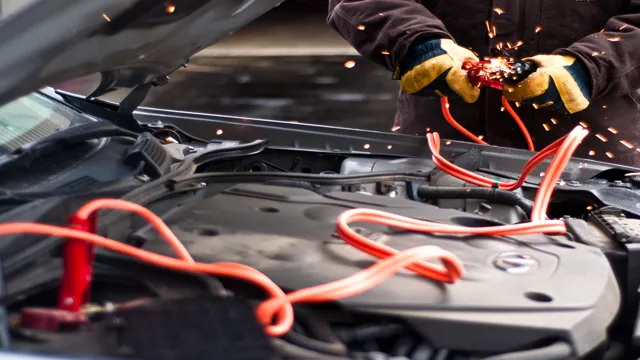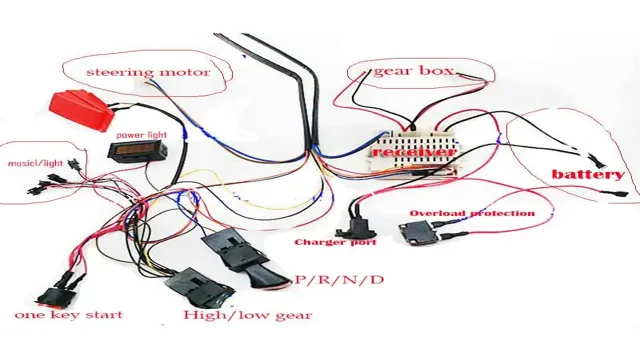The Shocking Truth behind Electric Car Batteries Exploding: What You Need to Know
Electric cars are gaining popularity, but with the increasing number of electric cars on the roads, concerns about their safety grow. One of the biggest buzzes surrounding electric cars is exploding batteries. What happens when an electric car battery explodes, and how common is it? In this blog, we explore everything you need to know about electric car batteries exploding – from what leads to an explosion to how to prevent it.
So, fasten your seatbelts and join us on this ride to debunking the mystery of exploding electric car batteries.
Causes of Explosions
With the rise of electric cars, concerns about the safety of their batteries have also become more prevalent. Electric car batteries exploding has been a cause for concern due to its potentially catastrophic consequences. One of the main causes of such explosions is due to overcharging, which causes the battery to heat up and release gases that may lead to an explosion.
Another cause is damage to the battery itself, which can cause a short circuit and explosion. Moreover, thermal runaway, an unexpectedly rapid temperature rise in the battery, can occur due to mechanical damage, overcharging, or manufacturing defects. The good news is that engineers and researchers are constantly developing better technology and safety measures to reduce or eliminate the risk of such incidents.
It’s important for electric car owners to follow the manufacturer’s recommended charging instructions and take care of their batteries to help prevent explosions.
Overheating and Thermal Runaway
Overheating and Thermal Runaway are the major causes of battery explosions. When lithium-ion batteries overheat, it can lead to thermal runaway, which is when the temperature of the battery increases rapidly and uncontrollably. The heat can ignite the flammable electrolyte solution inside the battery, causing an explosion.
This can happen due to a variety of reasons, including overcharging, physical damage to the battery, puncturing the seal or casing and exposing the electrodes, and manufacturing defects. In cases where the battery is subjected to elevated temperatures and humidity levels, it can result in the breakdown of the battery components and the release of flammable gases that can lead to violent explosions. Therefore, it is essential to properly maintain and monitor lithium-ion batteries to prevent overheating and thermal runaway and avoid hazardous situations.

Faulty Manufacturing or Design Defects
When it comes to explosions, one common cause is faulty manufacturing or design defects. This can happen with any type of product, from cars to electronics to even everyday household items. When companies rush to get their products to market, corners can sometimes be cut in the manufacturing process, leading to errors and defects.
In other cases, the design of the product may be flawed, resulting in a dangerous situation. These defects can ultimately lead to explosions, putting people’s lives and property at risk. It’s important for companies to prioritize quality and safety when creating their products to avoid these types of disasters.
By doing so, they not only protect their customers but also their own reputation and bottom line.
Incidents of Electric Car Battery Explosion
The world is embracing electric vehicles as a cleaner, sustainable mode of transportation. However, there have been reports of electric car batteries exploding, leaving people concerned about their safety. The incidents of electric car batteries exploding are thankfully rare, but they do happen.
The main cause of these explosions is the lithium-ion battery overheating and catching fire. This could be due to a manufacturing defect, damage to the battery, or charging the battery too quickly. However, these risks are generally much lower than the risks associated with conventional gasoline-powered cars, where fires and explosions can occur due to fuel leaks and other mechanical issues.
It’s important to note that electric vehicle manufacturers have stringent safety measures in place to prevent such incidents and are continuously working to improve battery technology to ensure it’s safer for consumers. So don’t let these rare incidents deter you from choosing an electric car as your next mode of transportation.
Tesla Model S Fire
The Tesla Model S fire incident raised concerns about the safety of electric cars. Although occurrences of electric car battery explosions are relatively rare, some incidents have been reported. Electric car batteries utilize a large amount of energy, which can create perplexing situations if not properly managed.
However, automakers conduct extensive safety testing to ensure that their electric cars are safe for consumers. Just like gas-powered cars, electric cars have their own maintenance requirements to ensure safe operation. It’s important to remember that any car, regardless of its fuel source, can have safety concerns if not cared for properly.
Chevy Volt Battery Fires
The Chevy Volt Battery Fires have been a source of concern for electric car owners and manufacturers alike. The incidents of electric car battery explosions have garnered attention from the media, and in turn, have caused consumers to question the safety of electric cars. However, it’s important to note that these incidents are relatively rare and that electric cars are still much safer than gasoline-powered cars.
The Chevy Volt battery fires were caused by a cooling system defect that caused the battery to overheat and catch fire. While this is certainly a serious issue, it’s important to keep it in perspective. Gasoline-powered cars experience fires and explosions much more frequently than electric cars.
Electric cars are still a new technology, and as with any new technology, there will be some issues that need to be addressed. However, the benefits of electric cars far outweigh the risks, and as technology improves, incidents such as the Chevy Volt battery fires will become less and less common.
BMW i3 Battery Fire
In recent years, there have been a few incidents of electric car battery explosions, causing concern for drivers and manufacturers alike. One high-profile case was the BMW i3 battery fire, which occurred in South Korea in 201 This incident prompted BMW to recall over 4,000 i3 electric vehicles worldwide.
While electric cars are generally considered safer than traditional gas-powered vehicles, incidents like this highlight the importance of proper battery management and safety measures. Manufacturers continue to work on improving the safety and reliability of electric car batteries to ensure the continued growth of the electric car market.
Safety Measures for Electric Car Batteries
Electric car batteries exploding can be a terrifying prospect for all drivers. Fortunately, there are several safety measures in place to help prevent this from happening. Firstly, electric cars come with a battery management system that ensures the battery doesn’t overcharge or overheat.
This system will also shut down the battery in case of any abnormalities. Additionally, many manufacturers have implemented cooling systems for the battery to keep it at an optimal temperature. Finally, it’s important to note that electric car batteries are incredibly durable, with many capable of withstanding collisions and extreme weather conditions.
While there is still a slight risk of the batteries exploding, the multitude of safety measures put in place has greatly reduced the likelihood of this happening. Overall, electric car batteries have come a long way in terms of safety, and drivers can rest assured knowing the necessary precautions have been taken to keep them safe on the road.
Battery Monitoring and Management Systems
Electric car batteries offer many benefits such as eco-friendliness and economic efficiency when compared to traditional gas-powered vehicles. However, it is essential to ensure the safety of electric car batteries by implementing appropriate battery monitoring and management systems. These systems help to monitor and regulate the temperature, voltage, and current of the batteries while charging or discharging to prevent overheating, overcharging, and short circuits.
One crucial safety measure to consider when handling electric car batteries is the use of protective gear such as gloves and goggles to avoid contact with electrolytes that may cause burns or eye damage. It is also important to handle the batteries with care, avoiding impacts and physical damage that may cause leaks or the release of toxic gases. In summary, implementing battery monitoring and management systems, protective gear, and safe handling practices ensure the safety and longevity of electric car batteries, promoting their continued use and maintenance.
Battery Testing and Inspections
Electric car batteries have revolutionized the automotive industry, but their safety must be taken seriously to prevent potential hazards. A crucial step is regular battery testing and inspections to detect any damages or issues that may arise. Safety measures should always be followed during the testing process, including wearing protective gear such as gloves and goggles, ensuring proper ventilation in the testing area, and disconnecting the battery before starting the inspection.
It’s also essential to rely on qualified technicians with experience working with electric car batteries to avoid any mishandling or errors during testing and inspection. These safety measures ensure that both the technician and the electric car owner are protected from any potential dangers. Always prioritize safety when handling electric car batteries.
Future of Electric Car Battery Safety
Electric car battery safety has been a hot topic in recent times due to the risk of batteries exploding. However, the future of electric car batteries seems promising with advancements in technology and safety measures. Battery manufacturers are investing heavily in research and development to improve the safety of their products.
One such technology is solid-state batteries, which use a solid electrolyte instead of liquid, making them less prone to explosions. Additionally, manufacturers are improving the thermal management systems of batteries, ensuring they stay cool at all times, reducing the risk of overheating. Further, there is a growing emphasis on standardizing safety protocols in the production of electric car batteries, and safety tests are becoming more stringent.
All these developments suggest that the future of electric car battery safety is bright, and the risk of batteries exploding on the road will continue to decrease.
Advancements in Battery Technology
With the rise of electric cars, one of the biggest concerns has been the safety of their batteries. However, advancements in battery technology have made significant progress in addressing this issue. The future of electric car battery safety lies in the development of solid-state batteries, which use a solid electrolyte instead of a liquid one.
These batteries offer higher energy density, faster charging times, and improved safety. They are also less prone to overheating and have a longer lifespan. Analogously, solid-state batteries are like a Jenga tower – each block is stable and secure, leading to a strong foundation overall.
This next generation of batteries represents a significant step forward and will undoubtedly play a crucial role in the transition to a sustainable future. As the technology continues to improve, it is only a matter of time before electric cars become the norm, and we no longer have to worry about the safety of their batteries.
Regulations and Safety Standards
As the world transitions to electric cars, there is a growing need to ensure the safety of the batteries that power them. Regulations and safety standards are crucial to prevent the possibility of accidents and fire hazards. In the future, electric car batteries are likely to be designed with better safety features.
These may include advanced materials that are resistant to high temperatures and mechanical stress, better thermal management systems, and more efficient battery management systems. In addition, regulatory bodies are already implementing safety standards for electric car batteries to guarantee their integrity. However, with the rapid development of technology, safety standards will have to keep up with the changes and advancements in battery technology.
It is essential that manufacturers and regulatory bodies collaborate to create and enforce robust safety standards to ensure the safe usage and handling of electric car batteries. In doing so, the future of electric car battery safety looks bright, promising not just innovation but also safety.
Conclusion
In the world of electric vehicles, there’s always a spark of excitement – but unfortunately, that spark can sometimes ignite more than just our imaginations. When electric car batteries explode, it’s a sobering reminder that even the most advanced technology can have its flaws. However, as with any new technology, it’s crucial to address and learn from these issues so that, in the end, the electric vehicle industry can continue to move towards a safer and more sustainable future.
So, let’s keep our eyes on the road ahead, but don’t forget to occasionally glance in the rearview mirror to see how far we’ve come.”
FAQs
Why are electric car batteries exploding?
There are a few reasons why electric car batteries can explode, including manufacturing defects, overheating due to improper charging or discharging, or physical damage to the battery.
How common are electric car battery explosions?
While electric car battery explosions are rare, they do occur and can be dangerous. The risk of battery explosion can be minimized through proper maintenance and handling of the battery.
What should I do if my electric car battery begins to overheat?
If you notice that your electric car battery is overheating, immediately stop charging or using the battery and disconnect it from any power source. Allow the battery to cool down before handling it again.
Is there a way to prevent electric car battery explosions?
Proper maintenance and handling of the battery can help prevent the risk of explosion. This includes regularly checking the battery for damage or defects, following the manufacturer’s recommended charging and discharging guidelines, and avoiding physical damage to the battery. Additionally, using high-quality batteries from reputable manufacturers can also help reduce the risk of explosion.






